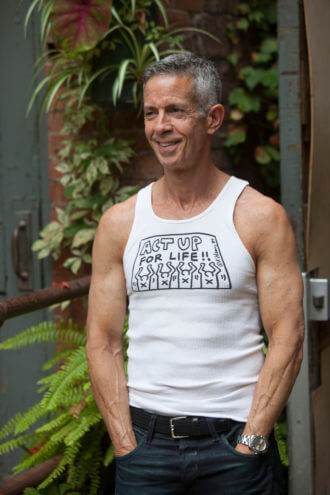BY DUNCAN OSBORNE | Standing on the wrong side of the rail in a Manhattan federal courtroom, Anton Jepsen was emptying his pockets, taking off his coat and removing his belt, and surrendering his possessions to two friends, who were visibly upset, before being taken into custody by a marshal.
Jepsen and his co-defendant, David Tart, were arrested by the Drug Enforcement Administration (DEA) last August in Penn Station as they stepped off a train carrying 4,661 grams, or just over 10 pounds, of methamphetamine. While both made bail, a condition of remaining free was that they abstain from using crystal. They could not do it.
“You’re both threats to the community and dangers to yourselves,” said William Pauley, the judge who is hearing the case, at the February 11 hearing. “The reports from Pretrial Services are outrageous.”
Gay, bi men snared in federal investigations; judges exercise greater sentencing discretion
Tart, who gave his possessions to his attorney, was screened right before the hearing and “he tested positive for methamphetamine,” Carlos Ramirez, a drug and alcohol treatment specialist with federal Pretrial Services, told Pauley. James DeVita, Tart’s lawyer and a partner at Doar Rieck Kaley & Mack, said that his client had been using the drug for years.
“Mr. Tart has been an addict for 15 years or more,” DeVita said, adding that Tart, who maintains his innocence on charges of conspiracy to distribute narcotics, tried to fulfill his bail requirements. “He’s made not successful efforts, but he has made efforts.”
Jepsen arrived late for the hearing, which Pauley noted, and was not drug tested. The judge looked at Jepsen and said that a drug test was not necessary. He could see that Jepsen had been using. Isabelle Kirshner, Jepsen’s lawyer and a partner at Clayman & Rosenberg LLP, reached a plea agreement with the federal prosecutor’s office, but the possibility that Jepsen might be high barred Pauley from accepting Jepsen’s plea.
“I think both of these gentlemen need to be parked,” Pauley said, and referring to Jepsen, he added, “Over the next 30 days, his access to his illegal drugs will be cut off.”
With methamphetamine use apparently increasing among gay and bisexual men in New York City, law enforcement has already responded. Gay City News found 10 recent meth cases in Manhattan federal court and others in the nation’s capital, California, and Virginia. Like the meth cases seen 10 years ago, when meth use in the LGBT community last came to widespread public attention, some of the defendants are HIV-positive gay men who sold the drug to support their habit.
Jepsen and Tart were among a group of at least six people who were initially identified by the Riverside County Sheriff’s Office in California in an investigation that used wiretaps, cell phone location tracking, and other surveillance. Palm Springs, a gay enclave, is in Riverside County.
The wiretaps, which began in January 2015, allowed the Sheriff’s Office to track a March meth delivery by car from California to Chicago, where police stopped the car and seized four-and-a-half pounds of meth. Court records do not identify the driver or indicate if the driver was arrested.
In April, police knew that Jeffrey Dawson, one of the six, would be traveling to Newark Liberty International Airport. He was stopped by the DEA after exiting the plane, and agents seized more than two kilograms of crystal from him. Dawson was released, which may indicate that he was cooperating with law enforcement. He was arrested in California on charges of conspiracy to distribute narcotics in November and is facing charges in Manhattan federal court.
While court records suggest that either Jepsen or Tart was told that Dawson had been stopped, one of them allegedly sold an ounce of meth to an individual in New York City in July who had been convicted and sentenced on a drug offense and was cooperating with law enforcement “in exchange for immigration benefits.” And as the DEA watched, Jepsen and Tart made their trip to Penn Station.
Generally, today’s defendants — as compared to individuals apprehended a decade ago —possessed larger quantities of crystal, ranging from several hundred grams to multiple kilograms, when they were arrested. And some of the current defendants found by Gay City News are alleged to be part of trafficking organizations.
What has also changed is that federal judges can carve out exceptions to mandatory minimum sentences in some cases. In 2005, the US Supreme Court ruled that the guidelines that were used to calculate mandatory sentences were advisory, a ruling that gave federal judges greater discretion in sentencing.
Gay City News found one defendant who was charged in 2010 and sentenced to “time served” and five years post-release supervision in 2011 after selling an ounce of meth to a “confidential source” in Manhattan and promising to sell the source more in the future, according to a sentencing document. Previously, the man, who is gay and HIV-positive, could have faced a five-year minimum sentence.
But in another case, a Queens man who was carrying 79 grams of meth at his 2014 arrest and had 538 grams of meth in his apartment when it was searched was sentenced to 135 months, or just over 11 years, and five years post-release supervision.
In the 2013 federal fiscal year, the US Sentencing Commission, an independent agency that advises federal judges on sentencing, reported that prison terms for meth offenders were nearly evenly divided with a third serving under five years, another third serving between five and 10 years, and another third serving more than 10 years. In the 2014 fiscal year, among all drug cases, “offenses involving methamphetamine were most common, accounting for 26.2 percent of all drug cases,” the commission reported.
“I’m surprised that this is still going on because I was under the impression that the Obama administration was going to treat it as more of a mental health issue rather than criminal issue, the [Department of Justice] was going to stop prosecuting as strenuously,” William Cullum, an artist who served just over six years for meth sales, told Gay City News.
While he served his time in the lowest security facilities, he describes it as “traumatic.” He currently has a “tendency towards isolation” and takes psychiatric medications.
“I wasn’t that way before and I’m that way now,” he said. “The thing that happened between was six years in prison.”


































